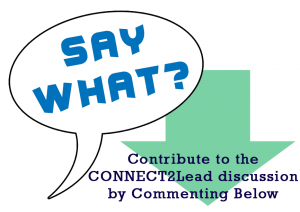Ten Warning Signs that You Aren’t a Good Listener
In today’s blog, we’re going to try something a little different. Rather than explaining the consequences of these actions and instead of prescribing solutions for leaders who inadvertently behave in these ways, I’m just going to give you these 10 warning signs that you may not be a good listener.
 My hope is that with some reflection and discussion in the comments field, you’ll finish the work describing why this matters and offer each other ideas on how to fix it.
My hope is that with some reflection and discussion in the comments field, you’ll finish the work describing why this matters and offer each other ideas on how to fix it.
Just start with a little candid self-assessment on these 10 warning signs. Then come back to the comments and share your thoughts!
- You have an agenda.
You aren’t listening for the sake of hearing what someone else has to say. You’re listening to buy yourself an obligated audience or for some other hidden motive.
- You interrupt others.
You get revved up and can’t hold back, jumping in to add your own experiences or ideas even before the speaker has finished sharing their own.
- You are very quick to respond to what’s been said.
You’ve been preparing your response the whole time the speaker was talking. Early on, you heard a snippet, and you were “off to the races” crafting what you would say.
- You “one up” the speaker to try to match each point made.
You’re looking at conversation like a competitive sport and would hate to lose the opportunity to have your two cents’ worth known on each and every detail.
- You jump to conclusions.
You allow your similar experiences and what you already know to prematurely influence your response in this situation.
- You ask close-ended questions more often than open-ended ones.
You are less interested in hearing the story, nuances and details than you are in getting just the facts. Sometimes, you find long-winded conversations to be tedious, so you try to limit what the speaker shares.
- You prefer to offer your ideas before hearing the other person’s.
The best defense is a good offense. If you can control the conversation by quickly, loudly and forcefully putting your thoughts on the table first, maybe you can efficiently end the excess of others’ ideas.
- You immediately judge what is being said.
You take the words at face value and react accordingly. You don’t consider context, feeling or motivation behind what’s been said, so you don’t see a problem with saying things like “that’s stupid” or “you’re wrong.”
- You try to solve the problem as soon as you hear about it.
You misunderstand the value you can offer to another person. Sometimes people want to be heard more than they want your solution. And sometimes they want your solution – but only if they first see that you understand the problem from their perspective.
- You frequently shift your attention to other people or tasks.
You are very busy, and you multi-task to get it all done. You do two things at once without thinking about what it signals to others when your attention is divided instead of devoted to them.
Okay, I can’t resist offering just one tip to kick off your contributions in the comments field. When there’s something important to be heard, make the time to listen. Set an appointment if needed and prepare for it by eliminating distractions (including the mental ones!). Your turn!
 This blog post is part of the CONNECT! Community’s August focus on connecting by listening. As a leader, you will be able to more effectively CONNECT2Lead when you actively and empathically listen to others with an intent to understand. Subscribe to our weekly CONNECT2Lead Newsletter for special offers, content, and blog. To God be the glory!
This blog post is part of the CONNECT! Community’s August focus on connecting by listening. As a leader, you will be able to more effectively CONNECT2Lead when you actively and empathically listen to others with an intent to understand. Subscribe to our weekly CONNECT2Lead Newsletter for special offers, content, and blog. To God be the glory!
